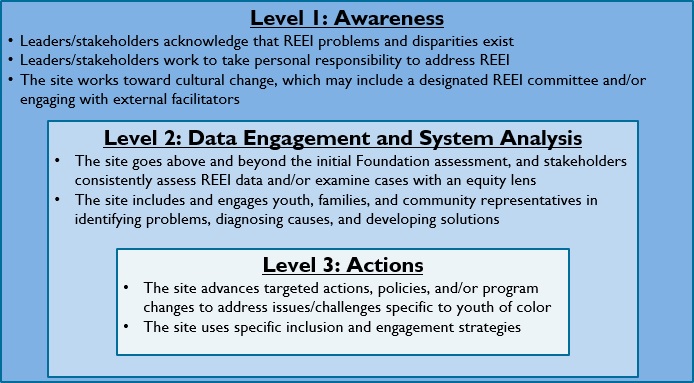![]() A growing number of local jurisdictions are engaging in juvenile justice reform efforts to reduce the number of youth in the justice system overall and particularly in out-of-home placements. In the era of COVID, with over 3,300 youth in juvenile justice facilities testing positive as of early January, these efforts are particularly urgent.
A growing number of local jurisdictions are engaging in juvenile justice reform efforts to reduce the number of youth in the justice system overall and particularly in out-of-home placements. In the era of COVID, with over 3,300 youth in juvenile justice facilities testing positive as of early January, these efforts are particularly urgent.
Addressing structural racism in the juvenile justice system and collaborating more closely with youth, their families and caregivers are two of the most important and challenging aspects of decarceration efforts and other types of juvenile justice reform. Both elements are pillars of the Annie E. Casey Foundation’s (the Foundation) local deep-end reform work, which involves collaborating with local jurisdictions to reduce the use of out-of-home placement, particularly for youth of color.
The Urban Institute and Mathematica collaborated on a developmental evaluation of the Foundation’s deep-end work that documented the creative ways 12 participating sites are engaging in policy and practice reform to advance race equity and increase youth and family engagement. Other communities seeking to achieve similar goals can benefit from the lessons learned from deep-end work.
Racial and ethnic equity and inclusion

Leah Sakala
Systemic racism is pervasive in the juvenile justice system. Youth of color, specifically Black, Latinx and Native American youth, are overrepresented at every stage of the juvenile justice system, including out-of-home placement rates. This is particularly concerning given the well-documented harm associated with incarcerating youth.
Additionally, even as the total number of youth who are incarcerated has plummeted in recent years, racial and ethnic disparities in youth incarceration have increased. These diverging trends emphasize the importance of holding the dual goals of racial justice and decarceration in juvenile justice reform efforts.

Janine Zweig
The Annie E. Casey Foundation centers racial and ethnic equity and inclusion (REEI) in its deep-end work, supporting strategies to both address inequity and advance collaboration with youth of color. Sites advancing deep-end reform work took steps to increase REEI across three primary domains (Figure 1):
- Increasing awareness of the importance of REEI through education and conversation to encourage stakeholders to take responsibility for addressing inequities. One example is bringing in an external organization to conduct a training on family engagement and facilitate conversations on racism and inequity.
- Engaging in data and system analysis to identify the extent and drivers of inequity in juvenile justice systems. Strategies included conducting a systematic case file review to understand disproportionality at different decision points and publishing and disseminating REEI metrics to communicate progress over time.
- Taking action to address REEI through targeted policy and practice changes and by increasing inclusion and engagement strategies. For example, based on a youth’s idea, one site created a program to decrease rates of supervision violations for absconding by identifying a safe location where youth on supervision can go if they need to leave their homes.
Some sites focused primarily on one or two domains, while others advanced work across multiple levels in parallel. Sites indicated the support from the Foundation was helpful for moving their REEI work forward and also emphasized the challenges associated with engaging in sensitive conversations and addressing long-standing inequities.
Evaluation Analysis Framework for REEI

Urban Institute
Notes: The deep-end evaluation team developed this framework based on analyses of data pertaining to REEI activities in sites. Although progress at lower levels can facilitate progress at higher levels, some sites engaged on multiple levels simultaneously.
Youth and family engagement
Collaborating with youth and families is another key component of the Foundation’s deep-end work and one that is directly connected to inclusion work more generally. Youth and families experience the most direct impact of juvenile justice system decisions and yet their voices are often not heard. Sites participating in deep-end reform worked to remedy that disconnect by advancing engagement in three primary ways:
- Developing resources and supports for families navigating the juvenile justice system, including disseminating newsletters, planning events to establish relationships, placing “family navigator” staff in court buildings who can answer questions and producing resource guides that detail juvenile justice system processes and explain how to connect with supports in the community.
- Participating in case planning at the individual level. One example is a team support approach that supports youth on probation by working with caring adults in their lives to address their needs, identify resources and repair harm.
- Collaboratively identifying and advancing reform priorities for the system as a whole. For example, one site created a formal Family Council to give parents and youth with probation experience a voice in probation practice and policy reform.
For more information on juvenile justice issues and reform trends, go to JJIE Resource Hub
Although all the deep-end sites we spoke with shared details about their family engagement work, efforts specifically to engage youth came up much less frequently. This may indicate a need to focus on targeted youth engagement in juvenile justice reform work separately from broader family engagement strategies.
Lessons for the field
Deep-end reform work can inform similar efforts in other communities. In fact, we asked deep-end stakeholders what lessons they considered to be particularly important for others seeking to engage in similar work. Some of the most common takeaways were:
- Investment in relationship-building among system stakeholders and with the broader community is critical. Good communication can facilitate that, including transparency and education about the goals and strategy of deep-end work.
- Bringing in external facilitators and resources and creating opportunities for peer learning can foster progress.
- Improving data capacity and use can help to increase stakeholder buy-in, identify challenges and track progress.
The experience of deep-end sites shows how deeply connected the goals of REEI and youth and family engagement can be. As one deep-end stakeholder told us: “I’ve shifted my perspective over the years. In the beginning, I was more about, ‘How do we change the policies and practices to have more equitable outcomes?’ I’ve shifted … to working with staff to engage them to work with kids and families in a different way in addition to the policies and practices. We’re working on creating a more antiracist multicultural institution in general and the rest of the stuff will come.”
Leah Sakala is a senior policy associate at the Urban Institute Justice Policy Center, where she co-leads a team focused on adult and youth justice reform and supporting community-driven safety solutions.
Janine Zweig, Ph.D., is associate vice president of justice policy at the Urban Institute, where she conducts research, evaluation and technical assistance for programs and policies related to violent victimization, juvenile justice and incarceration settings.
